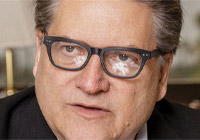THIS ISSUE OF BLUEPRINT was sent to our printer in the midst of a mushrooming crisis. As you read these articles, our nation might be recovering from COVID-19 — or the coronavirus pandemic might be growing more deadly. We can only hope for the former and weep at the thought of the latter.
That creates room for wonder: Does anything else matter when a scourge is coursing through the land? The answer, we think, is yes. The articles presented here examine an important idea — that research meets its test when it confronts the real world. That theme was conceived before the coronavirus crisis, but it seems even more meaningful in the midst of it.
The concerns at the heart of these chapters are not about COVID-19 per se, but about education, transportation, housing and homelessness. These are abiding challenges of our time. They raise questions — addressed here — about the interaction of research and human life. And those questions are precisely at the center of the coronavirus crisis, as well.
While researchers grapple with the spread of this disease, they are learning, adapting to the world even as they attempt to affect it. What works in China may not work in Iran or Italy or the United States. Italy has universal health care; that did not prevent the virus from wreaking havoc. The United States has a complex hybrid of public and private health insurance; it, too, has proven vulnerable to this affliction. Each society and government must use the tools and methods suitable to its culture.
Nonetheless, there are constants. Societies with confidence in government fare better than those whose governments have earned skepticism and derision. Leaders who command respect are more effective than those who lie, deflect, sow doubts and disparage science. Experimentation is useful and may chart the way forward. Patience is hard to muster, but essential for success.
These lessons are on display in this issue of Blueprint. A new idea — a better way to educate a child or to prevent a family from becoming homeless — begins with the intelligence of researchers and then demands the sturdiness of leadership. Lasting change requires a willingness to explore and explain, to admit when a theory has not worked and to rally around one that has. Candor is essential.
These are days of paradox. We need to work together to defeat a virus, but defeating it requires us to be physically apart. To ease an old problem, homelessness, we need to try new ideas. We try community schools to improve education, or strategic pricing to create more parking, knowing that these approaches may fail. What we know for sure is this: Refusing to try is the only guarantee of failure.
The future will tax our intelligence and strain our hearts. We and those we love will suffer. But those are reasons to push forward, not to give up. The work featured in this issue of Blueprint reflects wisdom, courage and a willingness to try. Those are mandates for our era. They will bring us closer to fulfillment for ourselves and generations to follow — a goal worthy of our work.
In the end, science and experience command the same from all of us. We must stay safe. And we must always take care of one another.























